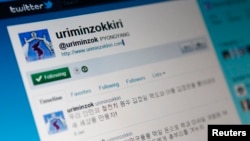North Korean state television has officially entered the Facebook era.
The official Korean Central Television has begun streaming its programs live on the popular social media website in a move presumably aimed at attracting more international viewers.
It is not the first attempt by North Korean state media to reach a global audience. One of its websites, Uriminzokkiri, already posts state propaganda on Twitter, YouTube, and Flickr.
The moves suggest Pyongyang, which allows virtually none of its population to access overseas websites, increasingly realizes the value of the Internet. But even so, it has done little to tailor its content to appeal to a wider audience.
Whether North Korean media is showing newscasts, children's material or movies, the content is mundane, focusing largely on the supposed accomplishments or activities of the three generations of the Kim family that have ruled the reclusive country.
For instance, Thursday's newscast began with a news anchor reading a lengthy item detailing a recent visit by the country's current leader, Kim Jong Un, to a local mushroom farm.
Aidan Foster-Carter, a veteran Korea expert and observer of North Korean media, says such material is typical of what is broadcast on state-controlled television, which is the only option for almost everyone in the country.
"Because of their fantastic egocentrism, they just churn out the same stuff that plays in Pyongyang, where people don't have an alternative, at least officially, regardless of whether it might fall flat and people will laugh at them," he said. "People have been trying to tell them that for years."
As long as Pyongyang refuses to spice up its content or broadcast in foreign languages, its audience will remain limited.
"South Korea still bans its own citizens rather absurdly from watching any North Korean websites and having a laugh with the rest of us," he said. "We'll see if that changes. Otherwise unless they broadcast in English, that will limit it yet further."
Under South Korea's national security law, its citizens are effectively outlawed from viewing North Korean propaganda, because of fears that Pyongyang will use the material to stir unrest.
The South's Yonhap news agency reported Thursday that the live stream was accessible in the South. But it quoted a Seoul police official who said the government is seeking to have the page blocked because it "conflicts with national interests."
Some information for this report was provided by AFP.
The official Korean Central Television has begun streaming its programs live on the popular social media website in a move presumably aimed at attracting more international viewers.
It is not the first attempt by North Korean state media to reach a global audience. One of its websites, Uriminzokkiri, already posts state propaganda on Twitter, YouTube, and Flickr.
The moves suggest Pyongyang, which allows virtually none of its population to access overseas websites, increasingly realizes the value of the Internet. But even so, it has done little to tailor its content to appeal to a wider audience.
Whether North Korean media is showing newscasts, children's material or movies, the content is mundane, focusing largely on the supposed accomplishments or activities of the three generations of the Kim family that have ruled the reclusive country.
For instance, Thursday's newscast began with a news anchor reading a lengthy item detailing a recent visit by the country's current leader, Kim Jong Un, to a local mushroom farm.
Aidan Foster-Carter, a veteran Korea expert and observer of North Korean media, says such material is typical of what is broadcast on state-controlled television, which is the only option for almost everyone in the country.
"Because of their fantastic egocentrism, they just churn out the same stuff that plays in Pyongyang, where people don't have an alternative, at least officially, regardless of whether it might fall flat and people will laugh at them," he said. "People have been trying to tell them that for years."
As long as Pyongyang refuses to spice up its content or broadcast in foreign languages, its audience will remain limited.
"South Korea still bans its own citizens rather absurdly from watching any North Korean websites and having a laugh with the rest of us," he said. "We'll see if that changes. Otherwise unless they broadcast in English, that will limit it yet further."
Under South Korea's national security law, its citizens are effectively outlawed from viewing North Korean propaganda, because of fears that Pyongyang will use the material to stir unrest.
The South's Yonhap news agency reported Thursday that the live stream was accessible in the South. But it quoted a Seoul police official who said the government is seeking to have the page blocked because it "conflicts with national interests."
Some information for this report was provided by AFP.





